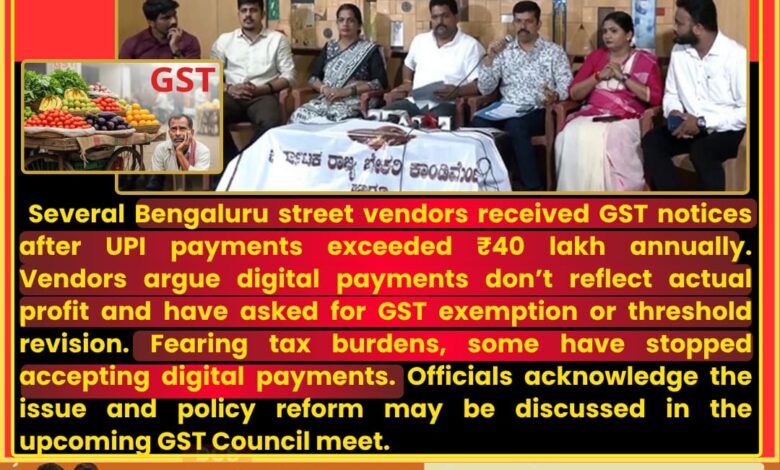
A growing number of street vendors in Bengaluru are urging the government for relaxation under Goods and Services Tax (GST) after receiving notices from tax officials. The reason: their UPI-based transactions exceeded the ₹40 lakh turnover threshold, making them liable to register under GST laws.
📲 Digital Payments Inflate Turnover, Vendors Say
The vendors argue that digital payments—especially via UPI, PhonePe, Google Pay, and Paytm—do not accurately represent their real income or profit margins, as most transactions are small and high-frequency. They claim this has unfairly pushed them into the GST bracket meant for larger businesses.
🗣️ Vendor Associations Raise Alarm
Organizations like the Street Vendors’ Union and local hawker groups have submitted petitions to the Karnataka state government and the GST Council, requesting either a higher turnover threshold or exemption for cash-equivalent digital payments in the informal sector.
🧾 GST Law and the ₹40 Lakh Threshold
Under current GST norms, businesses with annual turnover exceeding ₹40 lakh must register and file returns. However, street vendors—who typically operate without fixed premises or formal accounting—say the policy does not reflect ground realities, especially in urban metros like Bengaluru where digital adoption is high.
🧑💼 Officials Acknowledge the Complexity
A senior official from the Bangalore Central GST office said:
“We understand the concern. While digital payment volumes have increased, the current GST law counts gross receipts, not net earnings. A review may be required for sectors like unorganized retail.”
🛍️ Real Impact on Street Economy
Many vendors report that receiving notices has disrupted their operations. Fearing penalties or audits, some have stopped accepting digital payments altogether—hurting daily sales and customer convenience.
A food cart owner near MG Road said,
“I used UPI to avoid cash theft and increase business. Now, I’m being punished for going digital.”
🏛️ Call for Policy Reform in Informal Sector
Policy experts and economists are now calling on the GST Council to introduce a new compliance framework for informal and small-scale traders, possibly based on profit estimation rather than gross turnover.
A proposal for a differentiated GST threshold for digital-only transactions is expected to be discussed in the next GST Council meeting.









